As an owner seeing your beloved guinea pigs fight is really devastating. No one wants to see animals hurt each other. But don’t worry, the great news is that if you know the reasons why guinea pigs might start a fight, you can totally prevent that from happening in the first place.
Guinea pigs can occasionally start a fight with each other. The most common reason why they fight is to establish dominance (hierarchy). Some of the other reasons are the size of the cage (not enough space for both of them), boredom, breeding, and aggression caused by a health problem or injury.
Table of Content
Why Are My Guinea Pigs Fighting?
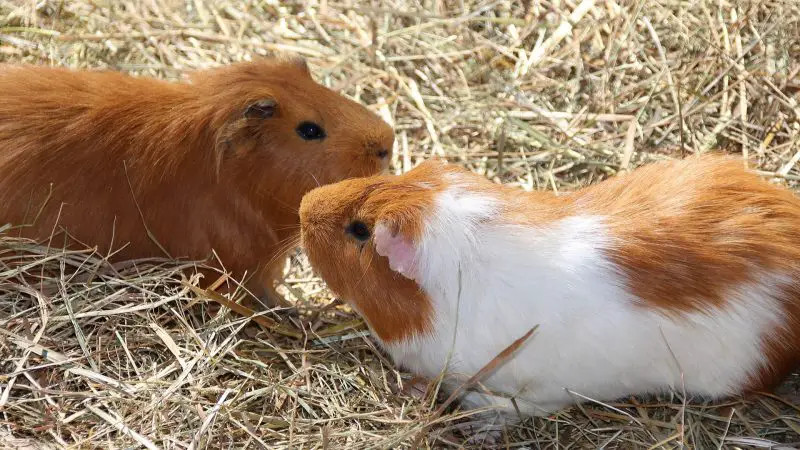
Knowing the main reasons why do guinea pigs fight is incredibly important when it comes to prevention. Thankfully, practically all of the time, it is relatively easy to determine the root cause of their fight. Some of the reasons include the following:
1. Establishing Dominance
Your guinea pigs might look fluffy and cute, but even these small rodents have a dominant guinea pig who wants to ‘rule’ the world.
These types of fights are natural. If one of the guinea pigs chooses to back down, then everything is going to be in order. However, if both of the guinea pigs want to be dominant and neither of them gives up, you will have to step in and separate them.
2. The Cage Is Too Small
If guinea pigs don’t have enough personal space, they will end up having a conflict or signs of aggression.
Guinea pigs will simply get annoyed with each other. Please remember that 10.5 square feet is a preferred guinea pig cage size for two guinea pigs. Moreover, they need to have more than one hiding place, so that the guinea pigs can use them at the same time. They really like to hide and you need to encourage this behavior.
Related: What Guinea Pig Cage Size Is the Best? (Proper Accommodation)
3. Wrong Pairing
Correct pairing is incredibly important. For example, you might not want to keep a male and a female together. Two male guinea pigs might end up having fights for dominance. Some experts also recommend introducing a younger guinea pig to your “old” friend, as there might be no problems with establishing dominance.
There are quite a few different scenarios when it comes to pairing them. You should take every single one into consideration before adopting a pair of guinea pigs. These are some of the possible scenarios:
- A single, castrated male among multiple females closely mimics guinea pig herds in the wild. This setting encourages guinea pigs to express their most natural behaviors, which can be quite interesting for a person to watch.
- Two sows, especially if they’ve lived together since infanthood, usually remain friendly for the rest of their lives.
- One older male will establish his dominance over a younger male companion and this is also a good combination.
- Two boars (males) that get along, preferably raised together, will fight much less than boars that just met. Each one should have his personal sleeping and eating space.
- A castrated male with a sow (female)
4. Health Issues and Pain
You were very proud of your guinea pigs because they seemed like the perfect family. Then suddenly, one guinea pig starts attacking the others. It could be the guinea pig that is acting aggressively is feeling some kind of physical discomfort. Make sure to take your pet to the vet as the it might be ill or injured in some way.
5. Unhappiness or Boredom
If your guinea pigs have something to do, they won’t have a lot of time to think about fighting. They will be playing with toys, nibbling on hay, and so on. However, if you fail to stimulate your cavies with vegetables and exciting toys, then the guinea pigs might get unhappy and bored. In some cases, they might consider fighting to be a fun idea.
My Guinea Pigs Keep Fighting | Should You Be Worried?
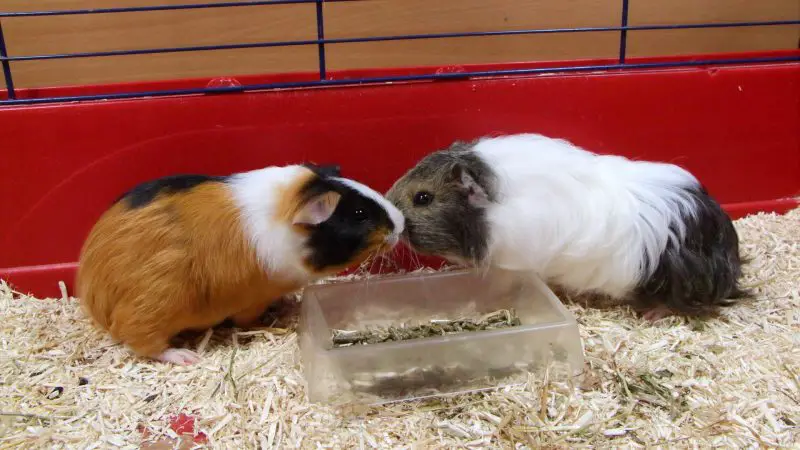
The truth is that you shouldn’t rush to the cage as soon as the guinea pigs start fighting. Firstly, they might be playing. Secondly, even if they are fighting, in most cases guinea pigs are able to sort the things out on their own.
If you are sure that none of the reasons mentioned above apply to your specific situation, then there is no need to worry. But do remember to keep an eye on your beloved pets whenever they are fighting. If they start getting too aggressive and make each other bleed (cause injuries), then you should most definitely step in and separate the two.
If your guinea pigs have continued to aggressively fight even after you have given them some alone time, it looks like the two guinea pigs are simply not compatible and won’t be able to live together. There isn’t much that you can do about it. Two separate cages might be your only option. If this situation happens, it is relatively rare.
Also, keep an eye on any signs of bullying. One of the cavies might be dominant and a bit too aggressive but in a passive manner. For example, the guinea pig might keep the other cavy from drinking or eating. That is a dangerous situation as well, so you might need to separate the two and allow the other guinea pig food and water.
Does Gender Affect How Much Guinea Pigs Will Fight?
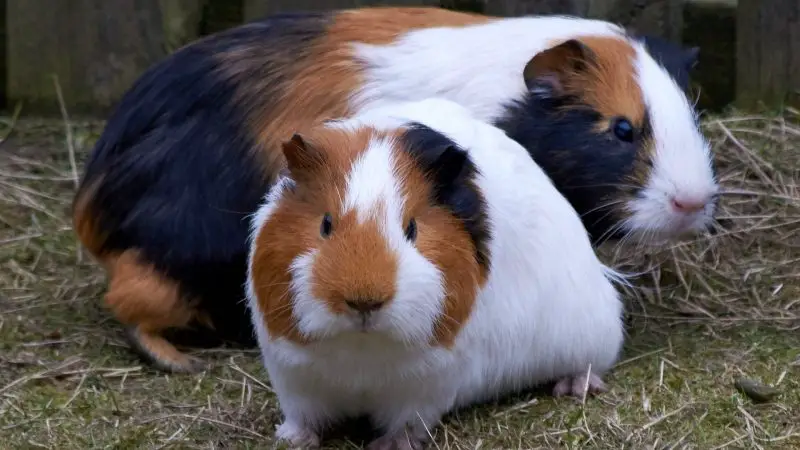
Gender certainly does matter a lot when it comes to fighting issues in guinea pigs. Experts recommend getting two guinea pigs of the same sex in order to avoid any quarrels. However, do bear in mind that even if you managed to pick the “perfect” pair, it does not mean that your beloved pets will never end up fighting.
Why Do Male Guinea Pigs Fight?
One of them might not be feeling well, the cage is too small and so on. In a lot of cases, two males end up fighting to figure out who is going to be the dominant cavy. If one of the guinea pigs decides to back up, there shouldn’t be any serious issues.
One of the reasons why a male guinea pig might be fighting with a female is because of mating issues. Usually, it is not recommended to have two guinea pigs of the opposite sex. Even if your main aim is to breed them, the two should be kept separately during the rest of the time. We know it might seem cruel and unethical. But if you want to avoid any issues, this is the best way.
Why Do Girl Guinea Pigs Fight?
Sows can also have fights in order to determine who is the “boss”. So, it is not a problem that is exclusive to males. The hormonal imbalance might also become a reason for the sow’s aggressive behavior. Such a condition can cause the female to develop ovarian cysts. These tumors cause a lot of pain and as a consequence aggression towards other guinea pigs. Of course, the poor thing has to be taken to the vet immediately.
During the mating season, the female might be aggressive towards the male as well. Moreover, sows should not be bothered during the pregnancy period, as it might lead to a conflict.
How to Stop Guinea Pigs from Fighting? | Instructions
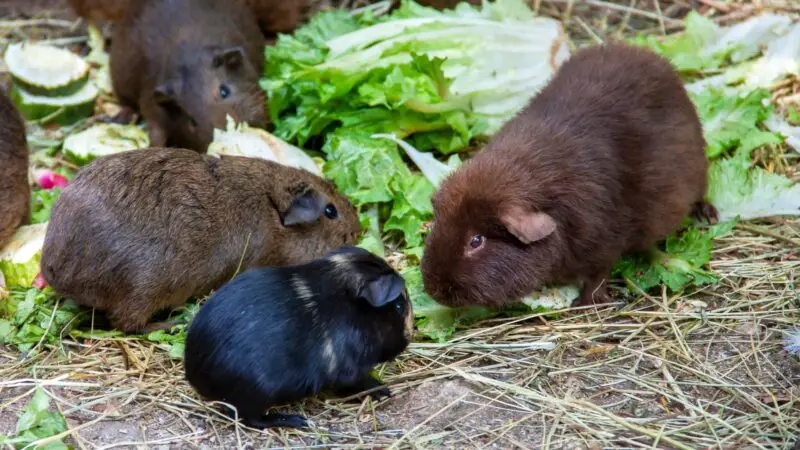
Whenever the guinea pigs try to establish dominance, it may look like a fight but it is absolutely a normal process. Thus, give them some time to fix things, however, do keep an eye on them. If you feel like the “ritual” is getting out of control, then follow the instructions that you will find in the following sections.
Two Male Guinea Pigs Fighting
Step 1: Identify the Reason Why They Fight
The first thing you would want to do is try and identify the reason why the two might be fighting. Take a close look at our list at the beginning of the article. Are you sure that the cage is big enough? Are the cavies feeling healthy? Do they have enough toys?
Step 2: Separating the Male Guinea Pigs
If everything seems okay, then it looks like the two males simply don’t have the matching characters. The best thing that you can do then is separate the guys.
To ensure that you don’t get bitten during the fight, wear thick gloves, or use a towel. You might want to try and put cardboard between the two guinea pigs to make sure that nobody attacks you.
Separating them is always the best idea, but you don’t have to use two cages to do that. If your main cage is big enough, then you can separate it into two parts, so that every guinea pig gets some time alone. After spending the night separately, you should reintroduce the guinea pigs back to each other.
Step 3: Reintroduce Guinea Pigs After the Fight
If the guinea pigs begin to communicate from their separate cages, the owner should prepare a neutral area for them to meet in. This is a place that neither of them has been to. It should have boxes and tubes for hiding, as well as food and hay for distraction and positivity.
It’s important to notice how the piggies react to one another, either they’ll start playing together and share space and resources, or they’ll hide and become stressed and aggressive, in which case they should be separated immediately. The session should end positively. Guinea pigs need several of these sessions before they can start again living together.
Food and two separate water bottles are essential for the piggies. The owner should continue monitoring their behavior until it’s sure that they’re calm and content with each other.
Step 4: Cleaning in Order to Reduce Their Scent
Another great thing that you can do is clean the cage more often. Cleaning will help partially get rid of their scent and that will sometimes ease the tensions between the two male guinea pigs.
Guinea Pig Sows Fighting
The instructions are pretty much the same for female guinea pigs as well. Make sure that nothing is bothering the two and that the cage is big enough for both of them. Separate the females but don’t forget to protect your hands. Take your time and reintroduce the sows to each other.
Remember that just like male guinea pigs, females might be trying to establish dominance as well. That is a natural process that you should not ruin otherwise even more problems could arise.
If your cavies have enough toys, hideaways, space, and are not injured, then you should definitely take the aggressor to the vet. There might be health problems that you are not able to see. However, do bear in mind that some guinea pigs are simply not compatible as these animals have strong, distinct personalities.
Guinea Pigs Fighting Over Food
As a wonderful owner, you would have to make sure that your guinea pigs always have enough food and water. In case you have more than one guinea pig, it might be a good idea to have separate food bowls and water bottles.
This is good in case the guinea pigs decide to have a snack simultaneously. If you provide bowls and water bottles for both of them, they will not annoy each other. The pets should also have enough fresh hay at all times.
If you see that one of the guinea pigs is not letting the other one eat or drink, then the two might not be compatible. However, you can try to use a cage divider and remove it after some time has passed.
Are My Guinea Pigs Fighting or Playing? | Important Differences
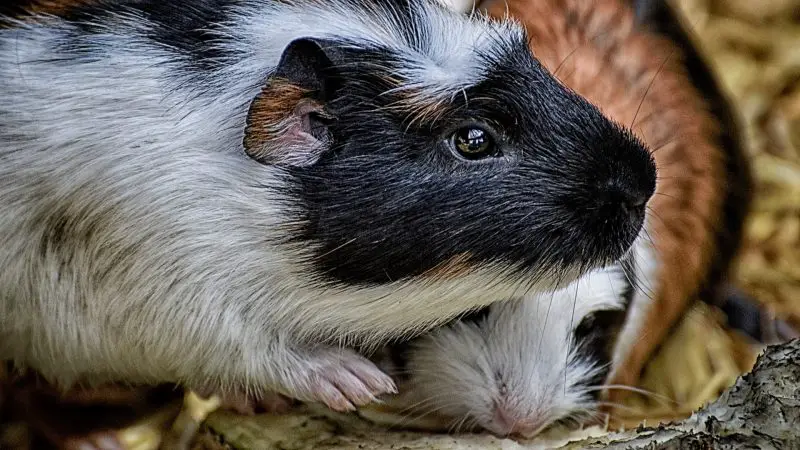
To understand the differences between fighting a playing, you would have to learn a bit about guinea pig’s body language and sounds. When the cavy is being aggressive, you will totally be able to see that by its body language. When the guinea pig is happy and content, it will purr and whistle but there are also many other signals that can interpret their happy behavior.
Generally, sniffing, humping, and light chasing is considered playing. But if the guinea pigs start biting one another, lunging with hostile intent or if you spot even a drop of blood, then the two are fighting and you have to step in.
If your guinea pigs are really friends, you might see them running around the cage together or playing with toys right next to each other. After that, the cavies might start playing with each other, and, in such a case, you will understand that it’s not a fight.
Do Guinea Pigs Fight to Death?
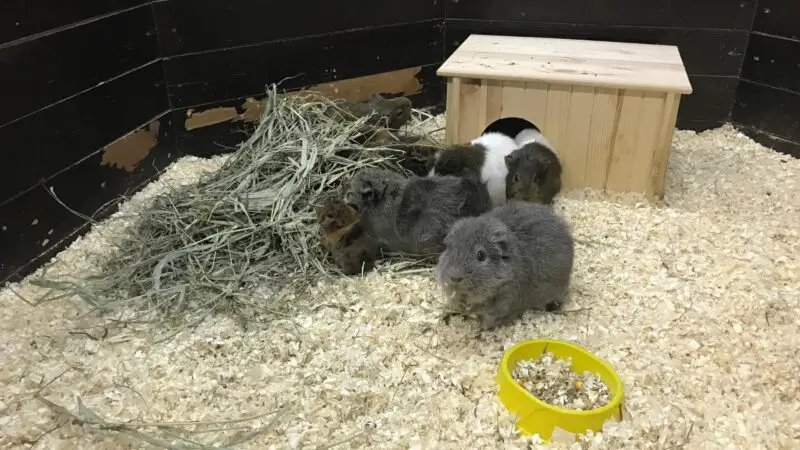
Unfortunately, if you fail to separate the two guinea pigs, one of them might end up dying in the worst-case scenario. One of the main reasons why a guinea pig might die after a fight is the injuries and wounds that are received during the “battle”.
If you didn’t step in at the right time, the guinea pig might bleed to death or may end up in a life-threatening condition. Also, the stress from a fight can cause them serious health problems that can lead to death.
Do Guinea Pigs Fight with Other Animals?
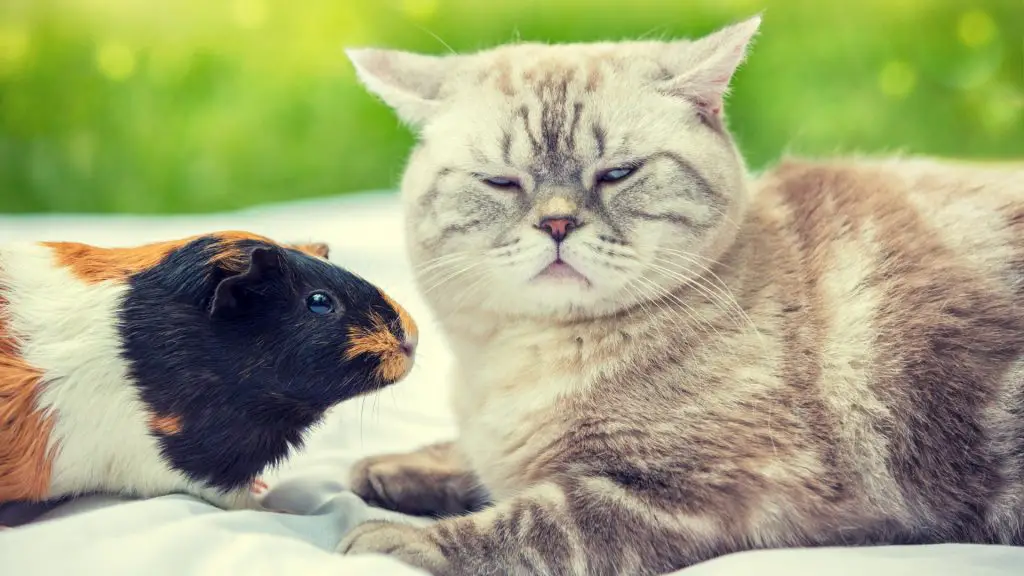
In the wild, guinea pigs are prey animals and many different predators consider them to be food such as wolves, coyotes, owls, and plenty of others. A natural reaction of a guinea pig whenever it is scared of something is to freeze. So, the chances are high that the guinea pig will not fight with other animals.
If you already have a cat or a dog, getting a guinea pig is not the best idea. Whenever other animals are around, the poor little thing gets stressed out. Moreover, bigger animals can easily hurt guinea pigs. If you managed to find a room that the cat or dog don’t have the access to, then it is better to place the guinea pig cage there.
You can’t predict every single response of an animal. The guinea pig can in some cases end up biting another animal, but such cases are extremely rare and certainly are an exception.
How to Help a Wounded Guinea Pig After the Fight?
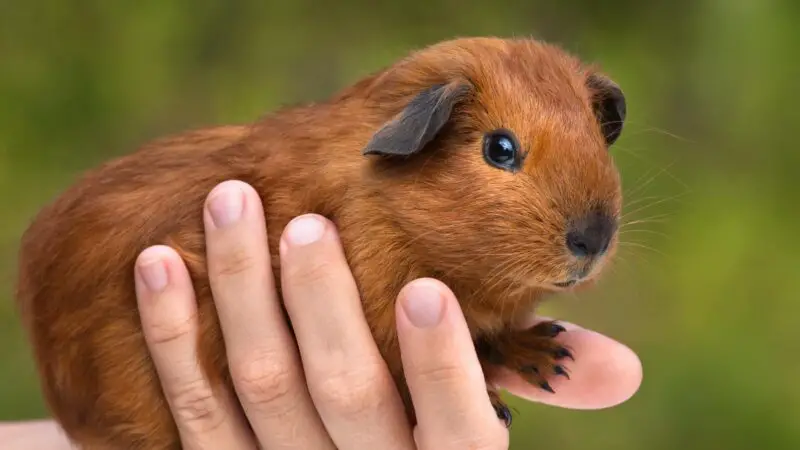
Step 1: Inspect Their Body for Wounds
The first thing you should do after the fight is to thoroughly check the body of your guinea pigs. Some wounds might be very small, but that does not mean that they can’t become dangerous to their health.
Pay extra attention to the top of the guinea pig’s back. This is the place that they cannot clean on their own. If the wound is not kept clean, it might get infected.
Step 2: Treating the Wounds
Once you have discovered the wounds, carefully wash the wounded spot, and use an antibiotic ointment. You can use a cotton pad to gently apply any antiseptic. Separate the guinea pigs and keep an eye on the wound to ensure that there is no infection.
Step 3: Visit the Vet (Optional)
Please pay a visit to the vet immediately when there is a lot of blood and if the skin has been severely damaged. Even if your guinea pig has received a small wound, you should still visit the vet as soon as you can if you don’t know how to properly disinfect it or have the necessary first aid kit for guinea pigs.
How Do Guinea Pigs Fight With Each Other?
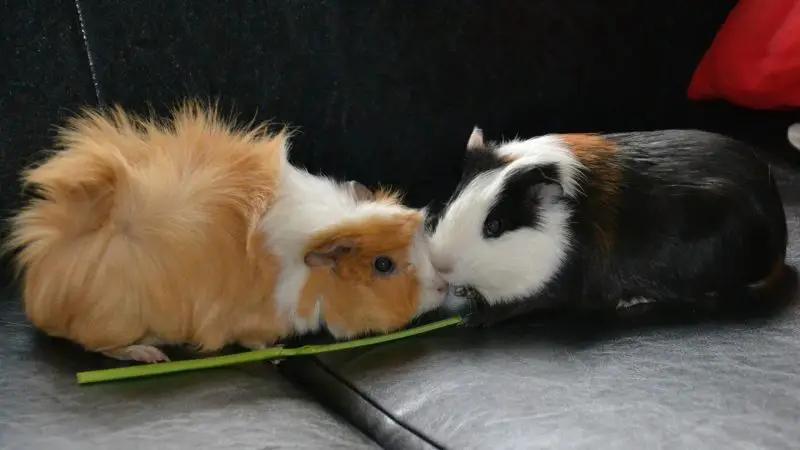
Guinea pigs are fleeing prey animals. Therefore, it’s rare to encounter an aggressive piggy. They depend on self-defense mechanisms such as hiding, freezing, running, and screaming. Only in dire face-to-face situations do they resort to fighting.
In some cases, the fight may escalate to dangerous levels, and that’s the time to separate the guinea pigs. The following are ways on how guinea pigs fight with each other:
- Attacking the Opponent’s Face – When a piggy head-butts its companion’s mouth, the next hit will involve teeth.
- Hair Pulling – A guinea pig may pull out its opponent’s fur in a fight.
- Blood Drawing Biting and Nipping – Happens because a guinea pig is angry, scared, annoyed, defensive, or maybe sick.
- Launching | Attacking – An excessive measure of aggression when neither cavy is ready to give up.
If left to fight, guinea pigs could seriously hurt each other, and later have no chance of reconciliation. The following issues are expected and there is no need to intervene when they occur:
- Pushing and Chasing – One guinea pig runs after another piggy to show that it’s stronger, faster, etc.
- Mounting – Not inherently sexual, but rather to literally determine the top dominant guinea pig.
- Yawning to Show off Teeth – Teeth chatter (hissing) is a rare signal that means stay away, and only happens under extreme circumstances.
- Standing up and Raising the Head – Guinea pigs measure up by competing who’s taller, and therefore stronger.
- Rumble-Strutting – The guinea pig swings its behind and rumbles to show dominance.
- Spraying – Marking territory by peeing on it.
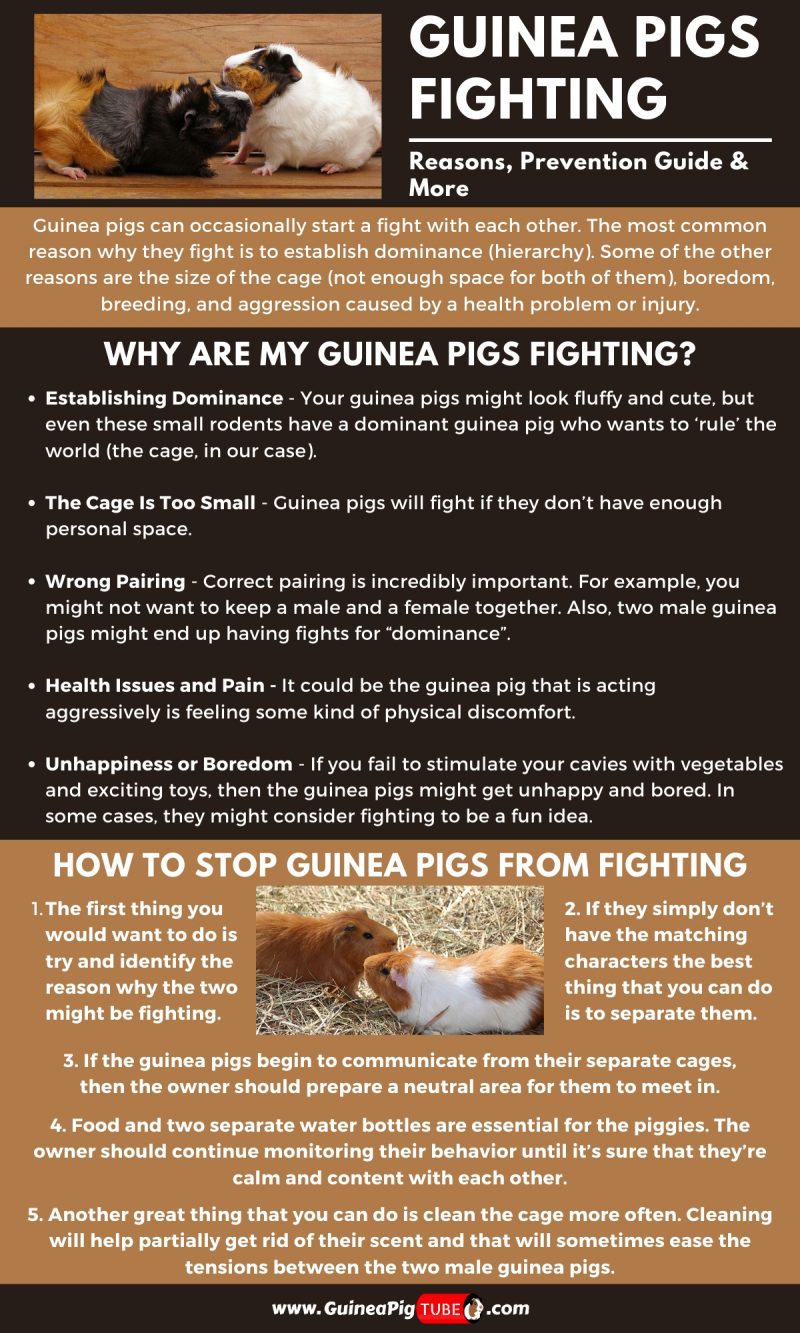
Unfortunately, even such cute and sociable animals like guinea pigs can get into a fight. Now you know the exact reasons why that might happen, so you can do your best to prevent any fights or aggressive behavior.
Always remember to monitor the behavior of your guinea pigs and consult the vet in case there is something abnormal about it. For more content on guinea pigs keep following or site. Best of luck!
List of Sources
Social Confrontation in Male Guinea Pigs: Behavior, Experience, and Complement Activity
Social Experience, Behavior, and Stress in Guinea Pigs
The Environment, Hormones, and Aggressive Behaviour: A 5-Year-Study in Guinea Pigs
Guinea-Pig Vocalizations: Their Structure, Causation and Function
